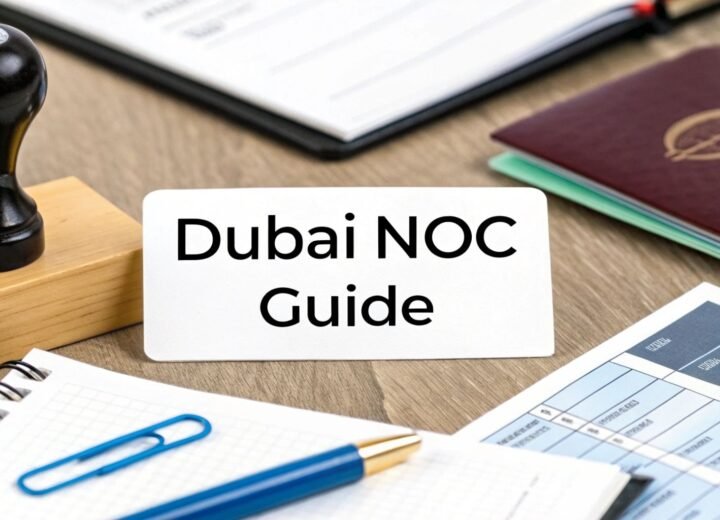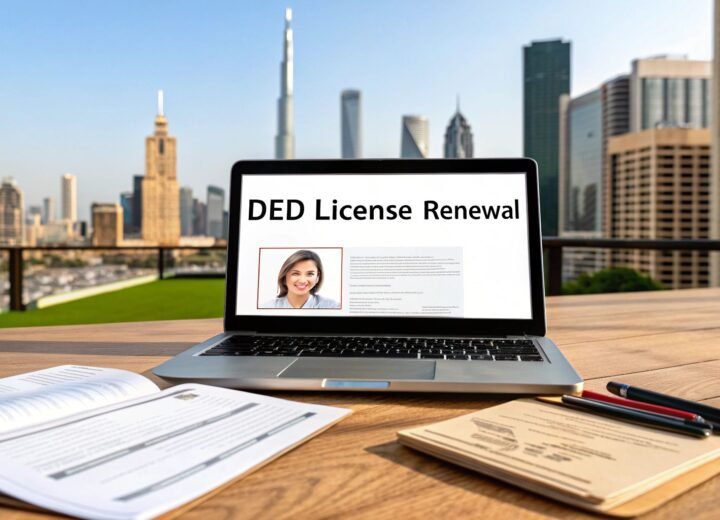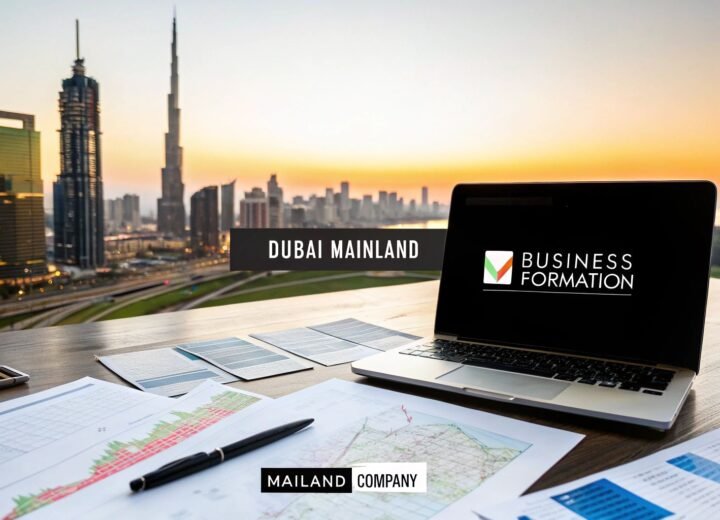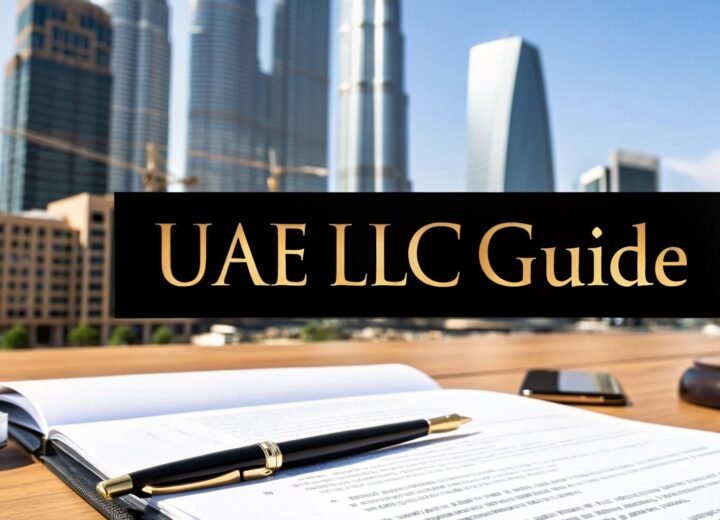Setting up shop in a Dubai free zone is an attractive path for international entrepreneurs, and for good reason. It offers a powerful launchpad, mainly because of perks like 100% foreign ownership, zero corporate taxes, and the freedom to send all your profits home. This entire structure is built to pull in foreign investment by cutting through the usual red tape you'd find on the mainland.
Why Choose a Dubai Free Zone for Your Business
For entrepreneurs looking at the UAE, the decision usually comes down to a few key strategic advantages. Setting up a free zone company isn't just about getting a trade licence; it's about embedding your business in a dynamic, pro-business ecosystem designed for global growth. The benefits go way beyond just taxes, creating a solid foundation for both startups and established companies.
These special economic areas operate under their own legal framework, separate from the mainland, which gives you a secure and predictable environment to work in. This is a game-changer because it gives foreign investors complete control over their business without needing a local partner or sponsor—a huge difference from a mainland setup. That autonomy is what the free zone model is all about; it lets you execute your vision your way.
To give you a clearer picture, here’s a quick rundown of the main benefits.
Key Advantages of Dubai Free Zone Company Formation
| Benefit | Impact on Your Business |
|---|---|
| 100% Foreign Ownership | You maintain full control without needing a local Emirati partner. |
| Tax Exemptions | No corporate or personal income taxes, maximising your profits. |
| Profit Repatriation | Send 100% of your capital and profits back to your home country. |
| Streamlined Setup | Faster and simpler company formation processes. |
| Industry-Specific Hubs | Access to specialised infrastructure and networking opportunities. |
| Global Connectivity | Prime logistics and access to international markets. |
These advantages collectively create a powerful and efficient base for any international business venture.
The Core Financial Advantages
Let's be honest, the biggest draws for a Dubai free zone setup are financial. The promise of zero corporate and personal income taxes is a massive incentive, letting you keep more of your hard-earned money for reinvestment and growth.
But the tax benefits are just one piece of the puzzle. Another critical advantage is:
- 100% Repatriation of Capital and Profits: Unlike many other global business hubs, you can transfer all your earnings and capital back home without any restrictions or currency controls.
This complete financial freedom means your business can be agile, moving funds where they’re needed without getting tangled in complex regulations. For any international entrepreneur, that kind of predictability is gold for long-term financial planning. If you want to dive deeper into the costs, you can check out our guide on the cheapest free zone in the UAE.
Operational Freedom and Global Connectivity
Beyond the money, Dubai's free zones are built to make international trade smooth and simple. Many zones are themed around specific industries—like tech, media, or commodities—which creates powerful business clusters with shared resources and networking opportunities right on your doorstep.
Think of an e-commerce brand setting up in Jebel Ali Free Zone (JAFZA). They can tap into its world-class logistics and port facilities to streamline global shipping, manage inventory, and easily serve customers across the Middle East, Africa, and Asia.
This kind of strategic clustering means you're surrounded by potential partners, suppliers, and customers, which naturally sparks collaboration and innovation. The proof is in the numbers. Recent reports show a huge jump in business registrations, with Dubai's economic zones seeing over 12,000 new companies in Q3 alone.
That’s a 22% increase year-on-year, highlighting just how much appeal the emirate has as a global business hub. Zones like DMCC and JAFZA are leading the pack. This buzz confirms that choosing a free zone puts your business right in the middle of a booming economic landscape.
Navigating Dubai's Top Free Zones for Your Industry

Choosing the right free zone is probably the single most important decision you'll make when setting up your business in Dubai. With more than 40 to pick from—each with its own rules, costs, and industry focus—it’s easy to feel a bit lost.
The trick is to ignore the flashy marketing and really dig into which zone gives your specific business a real strategic edge.
Think of it like this: you wouldn’t open a high-end fashion boutique in an industrial park. In the same way, a logistics company needs to be right next to a port, not tucked away in a media hub. Each free zone is its own ecosystem, built from the ground up to help certain types of businesses succeed.
This is why a one-size-fits-all approach just doesn't work here. A fintech startup, for example, will find its perfect home in the Dubai International Financial Centre (DIFC), thanks to its world-class regulatory framework and direct line to venture capital. A creative agency, however, would feel much more at home in the collaborative and inspiring vibe of Dubai Design District (d3).
For Tech Innovators and Digital Entrepreneurs
Dubai has worked hard to become a global tech hub, and several free zones are dedicated to keeping that momentum going. If your business is in software development, e-commerce, IT services, or emerging tech, these are the places you want to be.
Dubai Internet City (DIC) is the original and most established tech community in the region. It's where you'll find giants like Google, Microsoft, and Oracle, which creates a powerful network for B2B collaboration. For any tech-focused company, the infrastructure and talent pool here are unmatched.
Another fantastic option is Dubai Silicon Oasis (DSO), which is more of an integrated technology park. It doesn’t just offer office space; it has R&D facilities, industrial zones, and even residential areas. It’s a complete ecosystem for tech startups and established firms alike.
Hubs for Media, Creatives, and Marketing
If you're in a creative field, you need an environment that sparks collaboration and offers the latest facilities. Dubai has nailed this with specific zones that act as magnets for talent in media, advertising, design, and production.
- Dubai Media City (DMC) is the epicentre for media companies, from massive broadcasting networks to freelance journalists.
- Dubai Studio City (DSC) provides state-of-the-art facilities for film and television production.
- Dubai Production City (DPC) is built for the entire production value chain, including printing and publishing.
- Dubai Design District (d3) is a buzzing community for designers, artists, and fashion houses, filled with studios, workshops, and showrooms.
When you set up in one of these zones, you’re instantly part of a community that gets what you do and speaks your language.
The move towards specialisation is clear. Sector-specific business licences are now the norm in Dubai's free zones, with over 60% of new registrations happening in these specialised innovation clusters instead of generic trading. E-commerce, fintech, and AI-focused companies are really driving this, making up nearly 75% of all new sector-specific licences. This targeted growth is happening everywhere; for instance, the Dubai Multi Commodities Centre (DMCC) saw a 12% jump in registrations, heavily pushed by blockchain ventures. You can explore more about these business setup rules and trends to get a better feel for the market.
Comparison of Popular Dubai Free Zones by Industry
To help you get a clearer picture, I've put together a table comparing some of the most popular free zones. This should give you a quick snapshot of where your business might fit best.
| Free Zone | Ideal for Industries | Key Features | Starting Cost Estimate |
|---|---|---|---|
| Jebel Ali Free Zone (JAFZA) | Trading, Logistics, Manufacturing | Direct access to Jebel Ali Port, excellent sea-air cargo connectivity | AED 20,000 – AED 25,000 |
| Dubai Multi Commodities Centre (DMCC) | Commodities, Crypto, Consulting, Professional Services | Largest free zone, prime JLT location, flexible office solutions | AED 18,000 – AED 22,000 |
| Dubai Internet City (DIC) | Technology, IT, Software Development, E-commerce | Established tech ecosystem with major global players, strong networking | AED 15,000 – AED 20,000 |
| Dubai Airport Freezone (DAFZA) | Aviation, High-Value Goods, Pharmaceuticals, Luxury | Adjacent to DXB airport, premium facilities, rapid customs clearance | AED 22,000 – AED 28,000 |
| Dubai Design District (d3) | Fashion, Art, Design, Luxury Brands | Creative community, retail spaces, showrooms, regular industry events | AED 25,000 – AED 30,000 |
| IFZA Dubai | Consulting, Services, General Trading | Cost-effective packages, quick setup, no physical office requirement | AED 12,000 – AED 17,000 |
Remember, these are just estimates, and the final cost will depend on your specific licence, visa needs, and office space. The best approach is to shortlist a couple of zones and then get detailed quotes.
Global Trade and Logistics Powerhouses
For businesses dealing in import, export, and logistics, location and infrastructure are everything. Two zones, in particular, are global leaders in this space.
Jebel Ali Free Zone (JAFZA) is one of the world's largest and most successful free zones for a reason. Its direct link to Jebel Ali Port—the biggest man-made harbour—and Al Maktoum International Airport makes it an unbeatable logistics hub. It’s the go-to choice for trading companies, manufacturers, and anyone who needs seamless sea-air connectivity.
Dubai Airport Freezone (DAFZA) is another top-tier option, situated right next to Dubai International Airport. This makes it perfect for businesses that handle high-value, low-volume goods like electronics, pharmaceuticals, and luxury items that depend on fast air freight.
For Commodities and Professional Services
The Dubai Multi Commodities Centre (DMCC) is a truly unique and incredibly popular free zone. It originally focused on commodities trading—think gold, diamonds, tea, and coffee—but has since grown into the largest and one of the most diverse free zones in the UAE.
Today, DMCC is home to over 25,000 companies from a huge range of sectors, including professional services, consulting, tech, and blockchain. Its prime location in Jumeirah Lakes Towers (JLT), combined with flexible office options and constant networking events, makes it a fantastic choice for nearly any service-based business looking for a prestigious Dubai address.
As specialists in Freezone Company Formation across the UAE, our job is to help you find that perfect fit, making sure your business is set up for success right from the start.
Your Company Formation Journey From Start to Finish
Setting up a free zone business in Dubai can feel like you're trying to solve a complicated puzzle. But when you break it down into smaller, manageable milestones, the path from idea to official trade licence becomes a lot clearer.
Let's walk through that roadmap.
The first, and arguably most critical, decision is to nail down exactly what your business will do. This isn't just for your business plan; it directly impacts which free zones you can even consider and the type of licence you'll need. Each free zone authority maintains a strict list of approved activities, and getting this right from the start saves you from costly headaches down the line.
With your activity defined, it's time to think about your legal structure.
Choosing Your Legal Structure
For most entrepreneurs heading into a Dubai free zone, the choice typically comes down to two main options:
- Free Zone Establishment (FZE): This is the go-to for a company with a single, individual shareholder. It’s the perfect setup for solo entrepreneurs, consultants, or any single-owner business.
- Free Zone Company (FZCO): This structure is designed for companies with two or more shareholders. An FZCO is flexible, allowing for both individual and corporate shareholders, which makes it ideal for partnerships and multi-owner ventures.
This distinction is crucial. It directly affects your company’s Memorandum of Association (MOA) and can influence share capital requirements, which vary from one free zone to another. Making the right choice here ensures your company is properly set up for your ownership model and future growth.
Naming Your Business the Right Way
Once the legal form is sorted, the next step is picking a trade name. This is more than a creative branding exercise; the UAE has strict naming conventions that you have to follow to get your name approved. As a foundational piece of your business identity, it pays to understand how to properly choose a company name.
Your chosen name can't be offensive, blasphemous, or already registered by another company in the UAE. It also needs to reflect what your business actually does. For instance, you can't have "Trading" in your name if your licence is only for services. Our team is here to help you navigate these rules so your first-choice name sails through without a hitch.
Assembling the Essential Paperwork
This is where a lot of people get stuck. A single missing document or an incorrectly filled-out form can grind the whole process to a halt. While the exact list can vary slightly between free zones, the core documents are pretty consistent.
Here's what you'll typically need to get ready:
- Application Form: The completed registration form from your chosen free zone.
- Passport Copies: Clear, valid copies for all shareholders and the appointed manager.
- Business Plan: A concise but thorough plan detailing your business goals, activities, and financial projections. Some free zones look at this more closely than others, especially for specialised licences.
- Board Resolution: If you have a corporate shareholder, you'll need a resolution from the parent company's board approving the new free zone company.
- No Objection Certificate (NOC): This is required if any shareholder is already on a UAE residence visa sponsored by another company.
Insider Tip: Don't treat the business plan as just a box-ticking exercise. For many free zones, it’s a key document they use to judge the viability and legitimacy of your business idea. A clear, professional plan can genuinely speed up your approval.
The Final Stretch to Your Licence
After you submit your application and all the documents, the free zone authority starts its review. This kicks off the final stages of getting your company formed.
First, you’ll get an initial approval. This is the green light from the authority, confirming that your business activity, trade name, and shareholders have been accepted in principle.
Next, you'll sign the legal documents, like the MOA, and pay all the required fees for your licence, registration, and any office or visa packages you've selected. Once the payments are cleared and the paperwork is signed, the free zone will issue your official trade licence.
This licence is your legal permit to operate. Along with it, you'll get other vital company documents like your share certificates and establishment card. As specialists in Freezone Company Formation across the UAE, we handle this entire journey for you. Our corporate PRO services are designed to sidestep the common errors that frustrate so many entrepreneurs, making your path to a free zone business setup in Dubai as smooth and predictable as possible.
A Realistic Look at Your Business Setup Costs
Alright, let's talk numbers. When you're budgeting for a free zone business setup in Dubai, you need a clear picture of exactly where your money is going. The total investment isn't just a single figure; it’s a mix of one-time setup costs to get you off the ground and recurring annual expenses to keep your business running and compliant.
Getting this financial map right from the start is absolutely crucial for a smooth launch. The initial spend covers everything from your legal registration to getting those first official documents in your hands.
Breaking Down the One-Time Setup Fees
Your initial investment is made up of several key government and administrative fees. These are the costs you pay upfront to officially plant your company's flag in your chosen free zone.
Think of them as the foundational costs of your new venture:
- Registration Fee: This is a one-off payment to the free zone authority to register your company name and legal structure.
- Trade Licence Fee: This is what you pay for your business permit, which legally allows you to carry out your specific business activities.
- Establishment Card Fee: This card is essential. It registers your company with the immigration authorities, a non-negotiable step before you can even think about applying for visas for yourself or your staff.
These fees can vary quite a bit from one free zone to another. You'll often find that the more prestigious or specialised zones come with a higher price tag. We focus on providing cost-effective business setup solutions tailored to your needs.
Planning for Recurring Annual Costs
Once your business is officially up and running, your financial focus shifts to the recurring annual costs. These are the expenses you need to factor into your budget every single year to keep your company in good standing.
The biggest recurring costs you'll face are usually:
- Licence Renewal: Your trade licence isn't a one-and-done deal; it has to be renewed annually. This fee is often similar to what you paid for it initially.
- Office Rent: Even if you start with a simple flexi-desk or a virtual office, there’s an annual rental fee. This cost obviously goes up significantly if you need a dedicated physical office space.
- Visa Fees: Every residency visa linked to your company, including your own investor visa, has renewal fees. These come up every one to two years, depending on the visa's validity.
This visual guide shows the main stages, from getting your paperwork in order to finally receiving your licence.
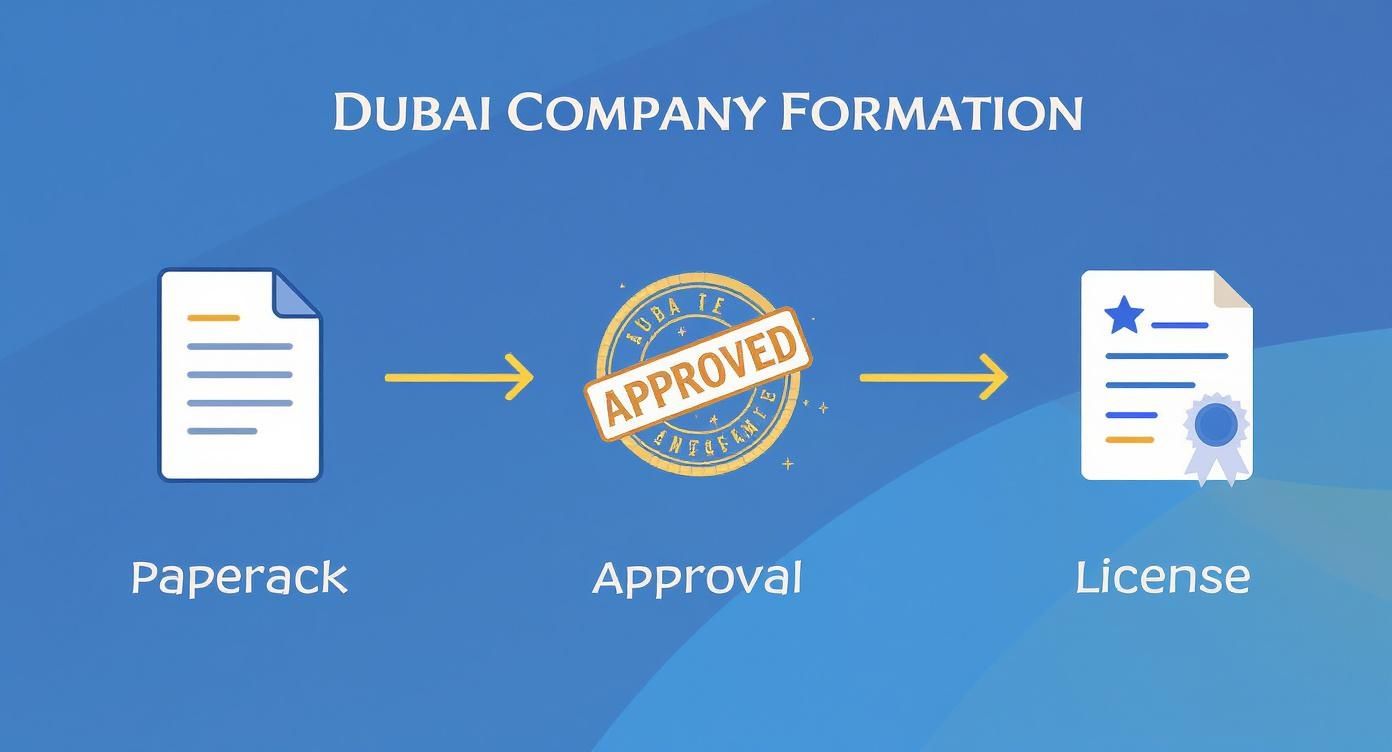
Each of these steps—paperwork, approval, and licensing—has its own specific costs that all add up to your total setup budget.
Cost Scenarios: Solo Consultant vs. Trading Company
To put this into a real-world context, let’s look at two completely different business models. The costs for a solo consultant are going to be worlds apart from those for a trading company that needs a small team and a place to store goods.
A freelance consultant, for example, might go for the most basic package available: a service licence, a flexi-desk, and one investor visa for themselves. For this kind of setup, the initial cost could be somewhere in the range of AED 15,000 to AED 25,000.
On the other hand, imagine a trading company with two partners and one employee. They’d need a trading licence, a small warehouse or office, and three visas. Their initial investment would be much higher, likely falling between AED 35,000 and AED 60,000, depending heavily on the free zone and the size of their facility.
For a more granular look, you can dive into our comprehensive analysis of the Dubai free zone company setup cost to help you plan your budget with more confidence.
Expert Advice: Always, always budget an extra 15-20% for unexpected expenses. This little buffer can cover anything from last-minute document attestation fees to small administrative charges you didn't see coming. It's the secret to a stress-free launch.
Securing Your Visas and Getting Expert PRO Support
Getting your trade licence is a huge milestone in your free zone business setup in Dubai, but it’s really just the beginning of the journey. The next critical phase is securing your legal status to live and work here. This means tackling the residency visa process, a multi-step procedure that turns your business dream into a reality on the ground.
The whole thing kicks off with an application for an entry permit, which is what allows you to be in the country for the purpose of getting your residency sorted. From there, you'll need to complete a mandatory medical fitness test and then go for your Emirates ID biometrics appointment. Every single step has its own requirements and timelines, and believe me, any small misstep can cause some really frustrating delays.
Understanding Your Visa Eligibility
One of the first questions I always hear from entrepreneurs is, "So, how many visas can I get?" The honest answer is that it completely depends on the free zone you've chosen and the specific company package you went with. A basic flexi-desk package, for instance, might only get you one or two visas. Securing a physical office space, on the other hand, typically unlocks eligibility for more.
This is a key strategic decision you need to make early on. It's vital to plan not just for your own investor visa but also for any staff you intend to hire and sponsor down the line. Plus, once your own residency visa is stamped in your passport, you can start the process of sponsoring immediate family members, like your spouse and children, to join you in the UAE.
The Invaluable Role of Corporate PRO Services
This is where the true value of professional support really shines. The sheer amount of paperwork, government liaison, and document submissions required for visas can be completely overwhelming for someone new to the system. This is exactly what Corporate PRO Services are designed for.
A dedicated PRO (Public Relations Officer) essentially acts as your official representative, handling all those critical interactions with government departments on your behalf.
Our team are specialists in Corporate PRO Services and Attestation Services. We take care of everything, from document clearing and submissions to immigration and labour departments to handling the tricky paperwork for medical tests and Emirates ID applications. We also manage document attestations, a crucial process often required for foreign documents like educational degrees or marriage certificates.
Working with an expert team prevents the common, seemingly small application errors that derail so many entrepreneurs. You can find out more about how our expert PRO services in Dubai can save you a ton of time and stress.
A successful business setup is more than just a licence; it's a direct pathway to securing your long-term future in the UAE. This is where options like the Investor Visa or the prestigious Golden Visa come into play.
As specialists in Golden Visa on Property and Investor Visa, we guide clients on how their business investment can help them achieve long-term residency, giving them and their families much-needed stability. This security is one of the ultimate benefits of the whole entrepreneurial journey.
Of course, part of settling into the UAE is understanding local requirements, and things like having the right United Arab Emirates Travel Health Insurance are crucial for peace of mind. With our 24/7 support service, we're always here to help you navigate every aspect of your new life in Dubai.
Expanding Your Business Beyond the Free Zone
It's a common myth that setting up a free zone business in Dubai means you're permanently stuck within its geographical borders. For a long time, that was more or less the case, but things are definitely changing. New regulations and strategic frameworks are starting to blur the lines between free zone and mainland operations, opening up some exciting doors for entrepreneurs who are ready to grow.
This shift means you're no longer boxed in. There are now clear, government-approved ways to get your products and services out across the entire UAE market. The best part? You get to keep the perks of your free zone status, like 100% foreign ownership and the attractive tax setup, while tapping into the much larger local economy. It’s all about creating a hybrid model that gives you the best of both worlds.
Strategic Pathways to Mainland Market Access
So, how do you actually make this happen? There are a few solid strategies, and the right one for you really depends on your business model and where you want to take it.
One of the most straightforward methods is to open a branch of your free zone company on the mainland. Think of it as a legal extension of your business that's allowed to trade directly with customers anywhere in the UAE. It does require getting approvals from the Department of Economic Development (DED), but it’s a clean way to operate under your existing brand.
Another popular route, especially for businesses dealing in physical goods, is to team up with a mainland distributor or agent. Your free zone company can handle all the import and logistics, while your local partner takes care of sales and distribution on the ground. This gives you instant market access without the headache and overhead of setting up a full mainland operation yourself.
Leveraging New Regulations for Greater Freedom
Recent government moves have really opened up the playing field for free zone companies. A key change, Resolution No. 11, now allows free zone entities to get a Mainland Operating Permit for certain activities. This is a big deal—it unlocks access to over 90% of the UAE's commercial opportunities and creates a much more integrated business environment. This change alone is expected to increase foreign direct investment by around 15%, which shows how serious the UAE is about attracting entrepreneurs. You can get more detail on how Dubai is unlocking new opportunities for free zone companies.
This new hybrid approach combines the tax perks of a free zone with the market access of a mainland company. It's a forward-thinking model designed for entrepreneurs who see their free zone setup not as a final destination, but as a strategic launchpad for wider expansion across the UAE.
As specialists in Mainland Company Formation in Dubai, Sharjah & Abu Dhabi, we help businesses navigate these exact scenarios. Whether you're thinking about a mainland branch or want to explore the new permit system, our job is to make sure you can grow your market reach while holding onto your core free zone benefits. You can also enjoy UAE tax benefits for international entrepreneurs, and with our 24/7 support service, we’re always here to help guide that growth.
Common Questions About Dubai Free Zone Setup
When you're looking into a free zone business setup in Dubai, a lot of practical questions come up. Here are some clear, straightforward answers to the queries we hear most often from entrepreneurs just starting their journey.
Can I Run My Free Zone Company While Living Abroad?
Yes, absolutely. You can maintain 100% ownership of a Dubai free zone company without being a UAE resident and manage all its operations from anywhere in the world. This setup gives international business owners incredible flexibility.
There is one crucial point to remember, though. When it comes time to open a corporate bank account, the bank will almost always require the owner to be physically present in Dubai. This is for the final signing and verification steps. The same applies if you or your staff need residency visas – that process has to be completed in person, here in the UAE.
What's the Real Difference Between a Free Zone and Mainland Company?
It really boils down to three things: who can own the company, where you can do business, and the tax situation.
- Free Zone: The big draw here is 100% foreign ownership. These companies are also typically exempt from corporate taxes. The trade-off is that you're generally restricted to doing business within your specific free zone or internationally.
- Mainland: While rules have relaxed, mainland companies historically required a UAE national partner. The major advantage is that you can trade directly with any customer or business anywhere in the UAE market. A mainland company might also be subject to corporate tax depending on its revenue.
As specialists in both Mainland and Freezone Company Formation, we can walk you through which structure truly aligns with your long-term business goals.
Choosing between a free zone and the mainland isn't just about the initial setup. It's a strategic decision that will shape your company's growth potential and market access for years to come.
How Long Does the Whole Setup Process Take?
The timeline can shift a bit depending on the free zone you choose and how organised your documents are. On average, you can expect your company licence to be issued within 7 to 15 business days.
After the licence is in hand, the visa process for an owner or an employee usually takes another two to three weeks to wrap up. This is where working with professional consultants really helps. We can help you avoid common document mistakes and speed things up by making sure everything is submitted correctly the first time, thanks to our expert Corporate PRO Services.
At PRO Deskk, we focus on providing cost-effective business setup solutions tailored to your needs, and we back it up with our 24/7 support service – always here when you need us. Let our specialists take care of the complexities of your company formation and visa processing so you can get back to what matters most—growing your business.
📞 Call Us Now: +971-54-4710034
💬 WhatsApp Us Today for a Free Consultation at https://prodesk.ae

